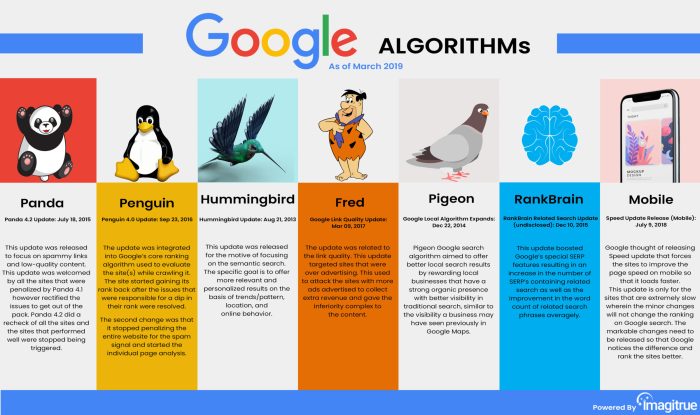Understanding SEO Algorithms – Kicking off with Understanding Algorithms, this opening paragraph is designed to captivate and engage the readers, setting the tone for a deep dive into the world of search engine optimization. From decoding complex algorithms to unlocking the keys to website visibility, this topic will take you on a journey through the digital landscape of .
Get ready to explore the inner workings of search engine algorithms and discover how they shape the online presence of businesses and individuals alike.
What are algorithms?

algorithms are sets of rules or formulas that search engines use to determine the ranking of websites in search results. These algorithms are constantly evolving to provide users with the most relevant and high-quality content based on their search queries.
Examples of popular algorithms, Understanding SEO Algorithms
- Google Algorithm: Google uses various algorithms such as Panda, Penguin, and Hummingbird to rank websites based on factors like content quality, backlinks, and user experience.
- Facebook Algorithm: Facebook’s algorithm determines which posts appear on a user’s news feed based on engagement, relevance, and other factors.
- YouTube Algorithm: YouTube’s algorithm ranks videos based on factors like watch time, engagement, and relevance to the user’s interests.
Importance of understanding algorithms for website ranking
Understanding algorithms is crucial for website owners and digital marketers to improve their website’s visibility and reach a higher ranking in search engine results pages (SERPs). By knowing how algorithms work, you can optimize your website’s content, structure, and performance to align with the search engine’s criteria for ranking. This can lead to increased organic traffic, better user engagement, and ultimately, higher conversion rates.
Factors influencing algorithms
When it comes to algorithms, there are several key factors that play a crucial role in determining search engine rankings. Understanding these factors and how they impact your website’s visibility is essential for developing an effective strategy.
Relevance of Content
One of the most important factors that influence algorithms is the relevance of your content. Search engines prioritize websites that provide high-quality, relevant content that matches what users are searching for. By creating valuable and informative content that aligns with popular search queries, you can improve your chances of ranking higher in search results.
s and Metadata
s and metadata are also critical factors that influence algorithms. By strategically incorporating relevant s into your content and optimizing your metadata, you can signal to search engines what your website is about and improve your chances of ranking for specific search queries. Proper research and implementation are crucial for maximizing your efforts.
Backlinks and External Links
Backlinks from reputable websites and external links to high-quality sources can significantly impact your website’s performance. Search engines view backlinks as a vote of confidence from other websites, indicating that your content is valuable and trustworthy. By building a strong backlink profile and incorporating relevant external links, you can improve your website’s authority and credibility in the eyes of search engines.
User Experience and Site Performance
The overall user experience and site performance also play a crucial role in algorithms. Search engines prioritize websites that are user-friendly, fast-loading, and mobile-responsive. By optimizing your website for performance, usability, and accessibility, you can enhance user experience and improve your chances of ranking higher in search results.
Updates and changes in algorithms
algorithms are constantly evolving to keep up with changing user behavior, technology advancements, and the need for more relevant search results. These updates play a crucial role in determining how websites rank in search engine results pages (SERPs) and impact the visibility of online businesses.
Evolution of algorithms
algorithms have come a long way from simple matching to more complex ranking factors that consider user experience, content quality, and backlink profiles. Search engines like Google are constantly refining their algorithms to provide users with the most accurate and helpful search results.
- Google Panda: Introduced in 2011, this update targeted websites with low-quality content and penalized them in search rankings. It emphasized the importance of high-quality, relevant content.
- Google Penguin: Rolled out in 2012, Penguin focused on penalizing websites with spammy or unnatural backlink profiles. It encouraged webmasters to focus on building quality backlinks from reputable sources.
- Google Hummingbird: Launched in 2013, Hummingbird aimed to provide more relevant search results by understanding user intent and context. It paved the way for semantic search and natural language processing.
Implications of algorithm changes
Algorithm updates can have a significant impact on website visibility and organic traffic. Websites that fail to adapt to these changes may see a drop in rankings, leading to a decrease in traffic and potential revenue. It is essential for businesses to stay informed about algorithm updates and adjust their strategies accordingly to maintain or improve their online presence.
Optimizing for algorithms: Understanding SEO Algorithms

To optimize content for algorithms, it’s important to focus on creating high-quality, relevant, and engaging content that aligns with the latest algorithm updates. Here are some effective strategies for optimizing content to improve search engine rankings:
Utilize Relevant s
- Research and use relevant s that align with your content and target audience.
- Include s naturally within your content, headings, meta tags, and image alt text.
- Avoid stuffing and prioritize user experience over density.
Create High-Quality Content
- Focus on creating valuable, informative, and engaging content that addresses the needs and interests of your target audience.
- Incorporate multimedia elements like images, videos, and infographics to enhance user engagement.
- Regularly update and refresh your content to stay relevant and provide up-to-date information.
Optimize Website Performance
- Ensure fast loading speeds, mobile responsiveness, and easy navigation for a positive user experience.
- Optimize meta tags, headings, and URLs for search engine visibility.
- Enhance website security with HTTPS encryption to build trust and credibility with users and search engines.
Adapting to Algorithm Changes
To adapt to algorithm changes, stay informed about the latest updates from search engines like Google, and be prepared to adjust your strategies accordingly. Monitor your website performance regularly, analyze data and metrics, and make necessary changes to optimize your content for search engine rankings.
Role of Quality Content
Quality content plays a crucial role in algorithm optimization by improving user engagement, increasing organic traffic, and building authority and credibility with search engines. Focus on creating valuable, relevant, and engaging content that meets the needs of your target audience to enhance your efforts and improve your search engine rankings.
